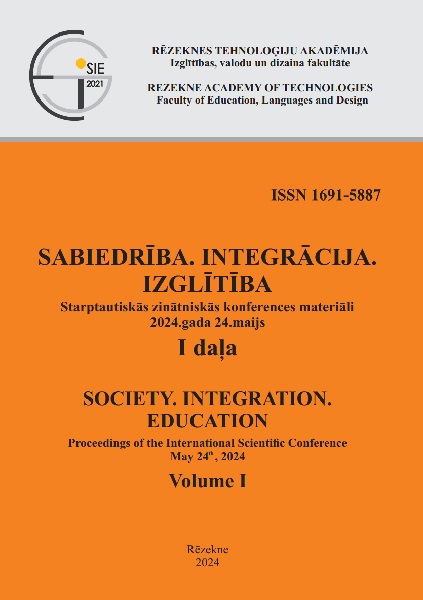INCREASING FUTURE ENGINEERS’ MOTIVATION FOR ACQUIRING ENGLISH LANGUAGE PROFESSIONAL COMMUNICATIVE COMPETENCE
DOI:
https://doi.org/10.17770/sie2024vol1.7889Keywords:
learning English, motivation, pedagogical experiment, technical studentsAbstract
Modern engineers have to constantly upgrade their knowledge and skills to stay relevant in today’s rapidly developing world and to establish professional ties with counterparts from other countries. It can hardly be done without knowledge of English as a dominant language of science and technology. Foreign language teachers in Ukraine and many other countries face the problem of improving technical students’ communicative competence to such a level that they could become full-fledged participants in intercultural professional communication. The problem can be solved provided that students have strong positive motivation for learning a foreign language.
The aim of the study was to select and test a complex of methods to increase future engineers’ motivation for acquiring foreign language communicative competence. These methods included problem-solving, case study, web-quest, dilemma, round table, essay, audiovisual translation, etc. The effects of the tried-and-tested methods were compared to the results of a traditional teaching.
The research was carried out at Kharkiv National Automobile and Highway University in 2021-2023 and aimed to compare 1) stability of students’ cognitive interest; 2) disclosure of creative potential; 3) development of language skills of two groups of learners: the experimental group and the control group.
The results of the study indicate that the use of special methods to motivate students for language learning had a significant positive impact on future engineers’ communicative competence.
References
Ammon, U. (2012). Linguistic inequality and its effects on participation in scientific discourse and on global knowledge accumulation—With a closer look at the problems of the second-rank language communities. Applied Linguistics Review, 3, 333–355. DOI:10.1515/applirev-2012-0016
Caon, F. (2020). Motivation, Pleasure and a Playful Methodology in Language Learning. EL.LE, 9(3), 437-460. DOI: 10.30687/ELLE/2280-6792/2020/03/006
Cheng, H. F., & Dörnyei, Z. (2007). The use of motivational strategies in language instruction: The case of EFL teaching in Taiwan. Innovation in Language Learning and Teaching, 1(1), 153–174.
Council of Europe. (2001). Common European Framework of Reference for Languages: Learning, Teaching, Assessment. Cambridge: Cambridge University Press.
Demir-Ayaz, A. (2016). The relationship between foreign language learners’ future second language (L2) self-guides, language learning motivation and achievement. Unpublished master’s thesis. Hacettepe University, Turkey.
Dweck, C. S. (2000). Self-theories: Their role in motivation, personality and development. Taylor & Francis: Philadelphia, PA. Elnikova, G. V. (1996). Organіzacіja dіjal'nostі pedagogіchnogo kolektivu shkoli shhodo kontrolju za zasvoєnnjam uchnjami zmіstu navchannja. Harkіv: HOІNOPP. Gonzales, R.D.L.C., & Lopez, M.Y. (2016). Foreign Language Learning Motivation Questionnaire: Further Examination of a Six-Factor Model. In A. B. I. Bernardo (Ed.), Counseling, psychology, and education: Essays in honor of Rose Marie Salazar-Clemena. (1–25). Manila: De La Salle University Publishing House.
Hassan, A. (2020) Are you getting obsolete? LinkedIn. Retrieved from https://www.linkedin.com/pulse/you-getting-obsolete-arif-hassan/
Kimura, Y. (2014). ELT motivation from a complex dynamic systems theory perspective: A longitudinal case study of L2 teacher motivation in Beijing. In K. Csizer & M. Magid (Eds.), The impact of self-concept on language learning (310–329). Bristol: Multilingual Matters.
Kumar, V. K., Riley Holman E., & Kemmler, D. (1997). The Creativity Styles Questionnaire – Revised. Creativity Research Journal, 10(1), 51–58. DOI:10.1207/s15326934crj1001_6
Marszalek, J. M., Balagna, D., Kim, A. K., & Patel, S. A. (2022). Self-concept and intrinsic motivation in foreign language learning: The connection between flow and the L2 self. Frontiers in Education, 7:975163. DOI: 10.3389/feduc.2022.975163
Morris, L. S., Grehl, M. M., Rutter, S. B., Mehta, M., Westwater, M. L. (2022). On what motivates us: a detailed review of intrinsic v. extrinsic motivation. Psychological Medicine, 52, 1801–1816. DOI: https://doi.org/10.1017/ S0033291722001611
Muir, C., & Dörnyei, Z. (2013). Directed Motivational Currents: Using vision to create effective motivational pathways. Studies in Second Language Learning and Teaching, 3(3), 357–375. DOI:10.14746/ssllt.2013.3.3.3
Pigott, J. (2012). A call for a multifaceted approach to language learning motivation research: Combining complexity, humanistic, and critical perspectives. Studies in Second Language Learning and Teaching, 2(3), 349–366. DOI:10.14746/ssllt.2012.2.3.5
Panagiotidis, P., Krystalli, P., & Arvanitis, P. (2023). Technology as a Motivational Factor in Foreign Language Learning. European Journal of Education, 6(1), 69-84. DOI: 10.26417/ejed.v1i3.p43-52
Pometun, O.І., & Pirozhenko, L.V. (2004). Suchasnij urok. Іnteraktivnі tehnologії navchannja. Kiїv: A.S.K.
Renninger, K. A., & Riley, K. R. (2013). Interest, cognition, and the case of l- and science. In S. Kreitler (Ed.), Cognition and motivation: Forging an interdisciplinary perspective (352–382). Cambridge: Cambridge University Press.
Shrestha, R. N., Pahari, B. R, & Awasthi, J. (2016). Impact of English on the career of engineering students: a brief overview in g(local) context. Journal of the Institute of Engineering, 11(1), 182-188. DOI:10.3126/jie.v11i1.14714
Yashima, T., Zenuk-Nishide, L. & Shimuzi, K. (2004). The influence of attitudes and affect on willingness to communicate and second language communication. Language Learning, 54(1), 119–152. DOI:10.1111/j.1467-9922.2004.00250.x






